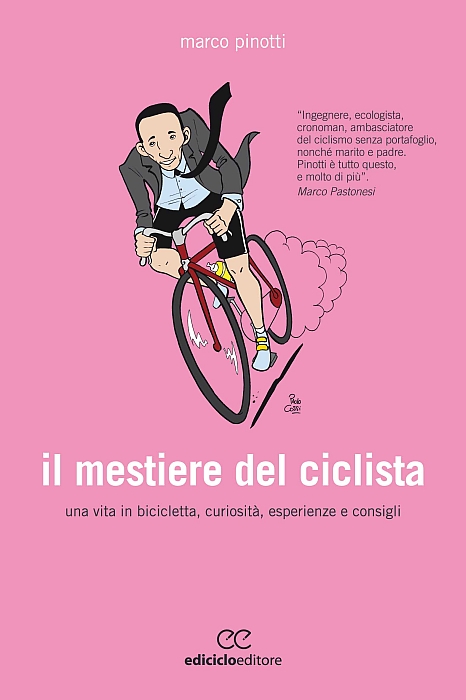
Italian professional Marco Pinotti’s new book, “The Cycling Professor” isn’t so much your classic sports biography as a collection of anecdotes and experiences from one of the nicest fellows and an old hand in the game.
In his book, the 36 year-old BMC rider from Bergamo takes the reader through his fourteen years as a professional cyclist, the teams he’s ridden for, why he began in the sport a wee bit later than his peers, his thoughts on the changes to the roads he trains and races on, improvements in training methods, how to cope with altitude training and the third week on a Grand Tour, and he details his views on some personalities in the peloton and the major races on the calendar.
Whilst it’s broadly chronological, starting with a chapter on Marco Pinotti’s education and early racing, the topics are ordered more by context, for example the section “In the Midst of the Group” discusses aspects such as finishing races, race radios, and the importance of knowing the course.
While writing it, Marco says he thought about all the changes cycling has seen, and all the changes he personally has gone through;
“I traveled the world, learned about better training tools and how to use more modern methods. I thought to myself, had I known all the stuff back at the start that I know now maybe I could have accomplished more in my career. This book is for the fans and those who know cycling – in Italy, for example, people only seem to know about the Giro d’Italia. Or in France, maybe they don’t follow anything else but the Tour. I’m opening their eyes to the races, to the training camps, to the technology that goes into cycling, diet… everything.“
In fact Marco has indeed accomplished a lot in his career; he’s been a consistent achiever contributing a great to deal to his teams and winning at least one race in most of his professional seasons, he’s been Italian Time Trial Champion five times, he’s won Ireland’s National Tour, and has twice worn the maglia rosa – the race leader’s jersey – and twice won the final time trial in his home tour, the Giro d’Italia.
The Italian version of Marco’s book entitled “Il Mestiere del Ciclista” (‘The Cycling Profession’) went to print last September, and he also wanted to produce a version in English but because his publisher wasn’t quite as keen Marco set about producing it himself, and this translated edition with the slightly different title has been available as an e-book since December.
Marco has said that compared to riding a three week national tour, writing a book is ‘much harder’ but we’re not convinced and caught up with him just before the BMC team launch in Belgium to ask him about his extra-curricular project ourselves…
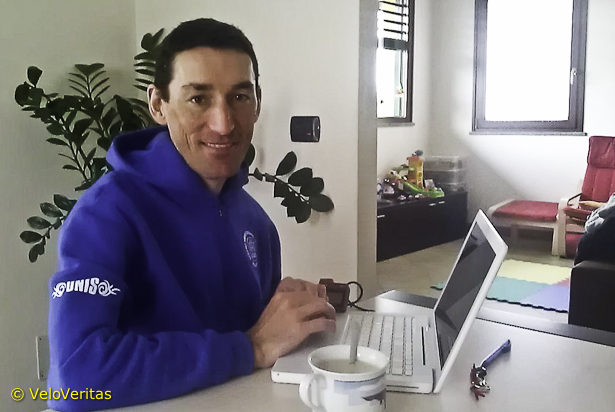
Marco, congratulations on your new book. It’s an interesting and unusual collection of memories and intelligent observations…
“Thanks, I’m glad you liked it!”
The book’s only available in print form in Italian, what was the reason for this?
“I did ask the publisher to produce the book in English, but at the moment they’re not committed to it, maybe they’re worried that they wouldn’t be able to return the investment.
“So then I asked for permission to organise a translation into English myself, and I looked at the services available on internet.
“I decided I could edit it by myself in digital format with the help of Amazon Kindle Direct Publishing.
“The editor at the Italian publishers granted me the rights to produce only the digital version.”
So you worked on the translation into English and it’s now available for Kindle on Amazon sites, but I understand there’s an interesting story about the translation by Fabrizio Viani, a club rider in London?
“Yes, I met Fabrizio through Twitter, in fact.
“I had read some entries on his blog and found them interesting and cute. We got in touch and he first helped me by describing the Time Trial course for the Olympics for me; he lives close to Hampton Court and since I didn’t have the time and resources to invest in looking at the course without being sure that I was actually selected for the Italian Olympic team, I asked him to recce the course for me using GPS.
“He even made a video for me of the course, and after that I analysed the course with the GPS file he made and I found that it really suited my TT skills perfectly.
“After that Fabrizio came to know about my book, he read the Italian version, and we both decided to give it a try with a translation of it into English.”
When did you begin writing it?
“The idea for the book started at the end of 2009, and back then the plan was that it was going to be released at the end of 2011, but in fact I didn’t really have time to put the work in, so it didn’t start on time.
“However, being sidelined for 12 weeks in 2011 freed up some time for me which helped me a lot!
“I thought when I began writing that I might be in with a shot at success at the 2012 Olympic Games in London and it would be nice to release the book right after that event.
“So I worked hard and made everything ready, then we waited until August last year for the final chapter.
“It was sent to the printers at the end of August once I’d completed the Games and written the last piece.”
So it’s all your own work, not ‘ghosted’ by a professional writer?
“No, not ghosted at all.
“Only Gino Cervi gave me some assistance. He works for an editor in Italy and helped me put the chapters together a bit – but I wrote each and every word myself!”
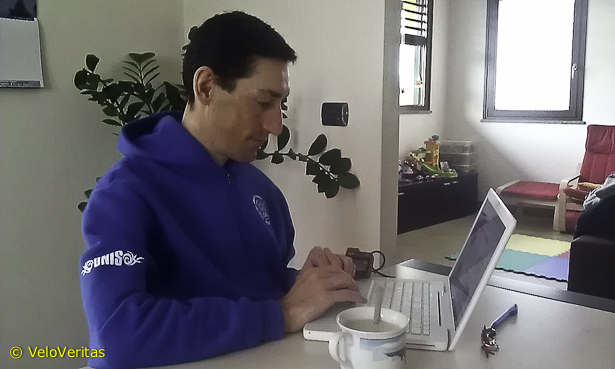
How did you find the time to write 56,000 words?
“It took me more than two years to write, so that helps explain it!
“It was more often during the winter months when I forced myself to sit and write at least three hours a week, usually late in the day or early in the morning.
“I did find it really demanding and very time-consuming.”
You’re well known as a rider who has a strong anti-doping position, and there is a chapter in the book on the doping issue, but you chose not to discuss the USPS case and the USADA ‘Reasoned Decision – why not?
“Well, the Italian version of the book was released in September last year, so had already been printed the month before, in August.
“I could have added a chapter about the USADA case into the English version which was produced later, but I think that there have been so many words printed about the subject already…
“But anyway, I decided early on that my book was going to describe the good side of cycling, the aspects of the sport that people get passionate about.
“Actually, I did add another chapter into the English version, the one about the World Championships in Limburg, talking about the crash in the Time Trial and the ‘lost medal’.
“So, this is my story.”
Do you think some readers of your book will find it unusual that Lance Armstrong is only remembered in the book through a story about him meeting friends of yours who were involved in cancer treatment?
“Again, the one story in the book is all the relationship with Armstrong I had; I describe the only time I was in contact with him personally.
“Even at the Tour in 1999 – which was my first one – I was never in contact with him, I was just totally focused on finishing my first Grand Tour.
“Of course, I read all the articles and debate about it all, just like everyone else has, but I didn’t want to repeat it in my book.”
Whilst you acknowledge the problem of doping in the book you don’t emphasise it, or weight it above all the other aspects of cycle racing. Do you agree with other riders who state that doping is much less of an alteration of the racing and the results than it used to be?
“Yes, this certainly seems to be the situation in the last four-five years.
“I think that’s mainly because the controls are more effective than before.”
Despite being a top rider, you’re very modest – how do you keep your ‘feet on the ground’?
“We all change in our lives a little as we get older… I don’t know why, but I am who I am…
“Thanks for noticing though!”
You went for a long time without any serious crashes, but you have had your fair share of them over your career.
“Sure, I have had my share of crashes, a few of them serious – just ask my wife or my parents! I think it is enough…”
One of the most recent was at last year’s World Championship Time Trial… you seemed to take that left-hand bend with caution but despite that your front wheel slid away from you…
“Yes, it was a mistake I made in the corner.
“It was my fault, I was too focused on time and power.”
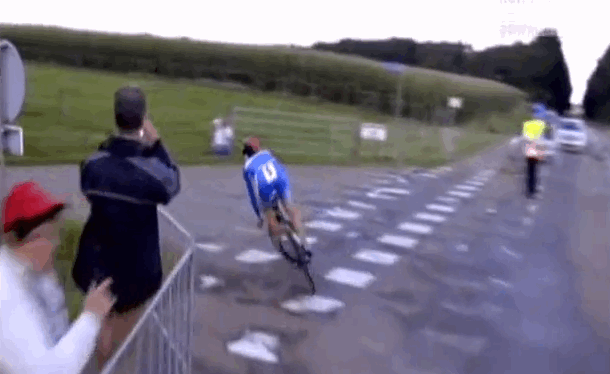
Paolo Bettini was obviously ‘feeling your pain’ as he comforted you when you realised you had to stop… he’s a good team manager?
“Definitely, Bettini is a very good manager.
“From the very first moment in charge of the national team he admitted to us he was not an expert in the Time Trial, but nevertheless he gave us a tremendous amount of confidence.
“In addition, he showed that he ‘knows cycling’ very well.”
The Worlds TT was a target for you, and you were lying in the top three at the point that you fell… how do you get over a disappointment like that?
“I can’t really talk about it anymore!
“That’s why I wrote my feelings in the chapter in the book.
“My approach in situations like this is pragmatic; ‘see what happened, learn from it, forget it, and then set a new goal – aiming even higher.'”
It’s clear from your book that you are able to see yourself and the racing in the context of life in general, your family, and so on – this must help you refocus on the next goal?
“Yes, definitely.”
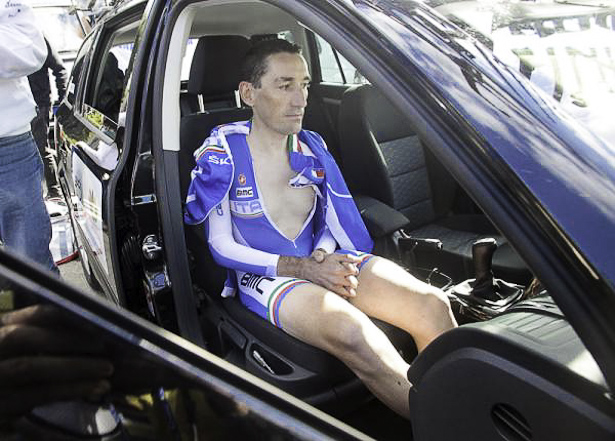
As well as the lows, you have also had some amazing highs such as leading the HTC team to the Team Time Trial win on Stage 1 of the 2011 Giro?
“You know, leading the team across the line in the TTT was one of the best days of my career.
“It was a real team accomplishment – and on a day where my Italian National Champion’s jersey was recognised by the tens of thousands of people present in Torino.”
Also winning the final time trial at the Giro d’Italia last year… there were a lot of 90° corners and cobbles on the course but you didn’t seem afraid of crashing in that race…
“No, I wasn’t afraid of falling – just like I wasn’t afraid in Limburg at the World Champs, but then I crashed there…”
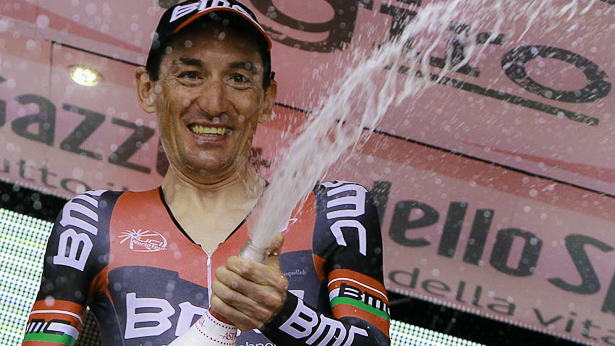
You talk in the book about being older and less willing to take risks in a race, but as a real racer is there still an element of “win or bust”?
“Yes, it’s a calculated risk; I give it everything I have but I try to stay safe at the same time.”
You’ll be teaming up with Allan Peiper again in the BMC team, who’s been hired to oversee various aspects of racing (a lot of which you mention in your book such as equipment selection, training data, wind tunnel testing, velodrome testing, training camps, race reconnaissance and nutritional needs). Were you involved in the decision to hire Allan?
“No, I wasn’t involved in the decision to bring him to the team, but as soon as I knew it was arranged I was extremely happy.”
What will his effect be on the squad?
“Allan will make a big difference to the team, especially with his organisational skills.
“Most of all though, simply because he is a great person and he’s able to understand human beings, he knows how to bring out the best from everyone.”
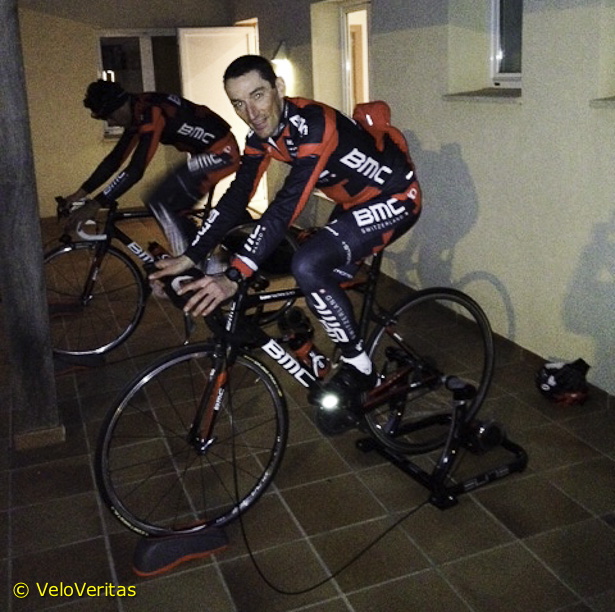
The BMC training camp in Benidorm in December was a somewhat bitter-sweet affair?
“Yes, it was for 10 days, although not with the entire team there.
“It was really great training and everybody had a good time with the guys from the team, and the new recruits.
“But of course we were saddened by Alessandro Ballan’s accident, which was just terrible.
“It happened near Parcent when we were descending the Coll de Rates, in the last hour of the last day of riding.
“Right now the successful (but slow) recovery of Alessandro is providing everyone with extra motivation for the season ahead.”
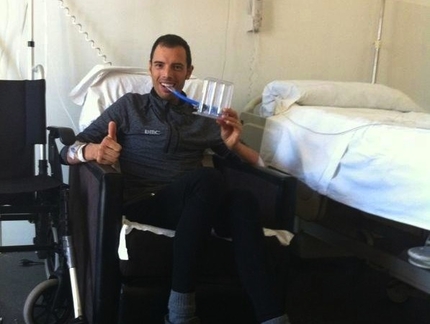
We wish Alessandro all the best for a speedy recovery. Beyond racing, where do you see your career? In the team car or perhaps in the press room?
“At the moment I’m leaving all the doors open and I’m only focusing on the moment.
“I’m a bike racer first and foremost so all my energy goes on training and concentrating on performing at a high level for BMC.
Lastly Marco, 2013 will be a great year if…?
“This season will be a great one if I win a medal in the Time Trial at the World Championships!”
With thanks to Marco for his time with this interview, and wishing him all the best for the year ahead – let’s hope it is indeed a great one.
Keep it tuned to VeloVeritas – over the coming weeks we’re privileged to be able to bring you extracts from Marco’s book!
Buy Marco’s book for your Kindle device or app on Amazon,
or why not treat yourself to the printed paperback version in Italian.



